You have more genius inside you, and this guide helps you understand it. (Note: I've only been on Hive for a month or so, and this is my first post in C/Gems, I hope this is ok? It's in two parts because of Hive's post-size limit.)
Also, this piece was inspired by the original 'non-dialogue' version here: jryze.me/smart
Genius: What It Is, Where It's From, & How To Get It!
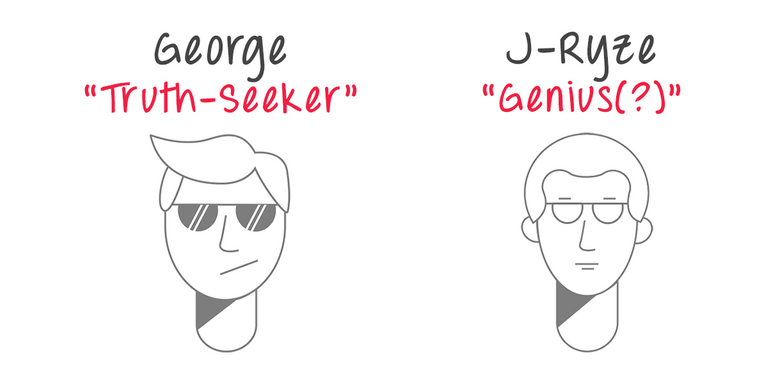
George and I were sitting on Granite Brewery's patio, talking about genius.
"I'm annoyed, J. I want to be smarter. I'm sick of bad decisions. I'm tired of getting lost on society's tough topics. I want to impress my team at work. Actually, screw that, I want to impress myself."
"So do it!" I exclaimed. George seemed like he could use some encouragement.
"I feel like it's important to understand genius first. That's why I'm annoyed. Weeks of google research hasn't told me anything useful. It feels like I need to be a genius just to understand genius."
"Ah yeah, I hear ya. Most people teaching on the topic use big fancy words and convoluted concepts."
"Exactly!" George sipped, then smiled.
Like me, he was savoring his 'Ringberry' beer. It was gold-tinged, and subtly banana-flavored. I wasn't sure where it got it's name.
"Well, kick back, enjoy your beer, and let's see if we can simplify genius for ya."
"Thank you. My first question is...
Are 'dumb' people writing about 'smart' ones?
Because the fluff I've been reading on the net does not seem that smart."
"OK, so... I hate to admit this, but I’ve called a lot of people dumb. Like many people, I don’t mean it when I say it, and I truly do love people. But I confess, I've labeled people as 'dumb' before."
"I appreciate the honesty, but s'all good, I know you have a good heart."
"Right, but labeling sucks, right? Like, you never want to call someone ‘slow.’ Or ‘unintelligent.’ It doesn’t go over well. Imagine you’re talking to your friend, Samantha. You’re excited about your new ‘human design’ business. You share some cool new ideas you have. Samantha’s smile feels genuine. She nods in all the right places. You leave the conversation feeling good about yourself. A week later you mention it again and Samantha has no clue what you’re talking about. She didn’t understand your new ideas, and worse, she acted as if she did. You realize she’s dumber than a sack of hammers, but you’re wise enough not to say so. You wander off, thinking that you’re smart, and she’s not. Is this a fair judgment, just from a couple of interactions? Is she really, truly, actually 'dumb?'
"I guess that'd be a pretty big assumption."
"Right. In fact, it's likely her intellect is fine. There could be many reasons why things played out the way they did."
"OK, so should I just abandon my whole exploration into genius, and stop labeling people entirely?"
"Well, avoiding labels is often a good path, but it'd be hard to do it entirely."
"Why?"
"Because humanity is made of spectrums."
"Oooh, droppin' science words on me. You making this sh*t up?"
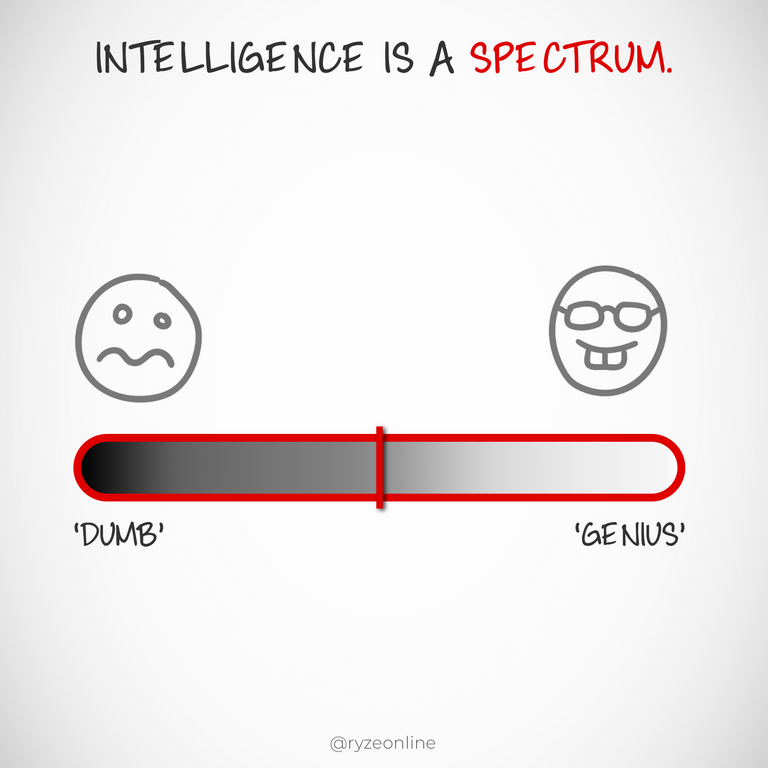
"It's not that crazy. You deal with spectrums everyday, you just don't call 'em that. There’s a 'love/hate' spectrum. Some people behave more lovingly, some less so. There’s a 'fame/obscurity' spectrum. Some people are more ‘in the limelight’ and some are more ‘behind-the-scenes.’ There’s a 'charm/repel' spectrum. Some act more charming, some less so."
"Ahhh, got it. These 'spectrums' of behavior you're talking about 100% exist. Like, everywhere."
"Yep, and because they exist...
Some people think ‘better,’ and some less so."
"Yeah, but when I searched, nothing struck me as all that smart. Or it was so complicated and fancy I assumed it was smart, but didn't bother reading it."
"OK, let’s say you hop on your PC and google 'intelligence.' As usual, you click a top-ranked result and start reading. What are the chances that that top-ranked result is written by the world’s truly smart people? What are the chances people on the high end of the ‘smartness spectrum’, sat down and wrote a page-one article on intelligence? Did Einstein write a Google-ranking article? Did Stephen Hawking cover it? Did Tesla publish a dissertation on genius? What I’m getting at is this:
Most of what you’ve read on intelligence, ain’t as good as you think."
"Dude. Literally what I've been saying." George tilted his head back and rolled his eyes.
"OK but I mean even the best stuff written about genius, fails to really get to the root of it. Like, even if you seek out ‘peer-reviewed journals’ or recent studies, you won’t learn much. These are often disproven by another study a year later. Plus they’re often written by people who are ‘good at one thing’, but not ‘truly smart’. Hopefully, I can do better."
"Uh, yeah, that's why we're drinking our faces off."
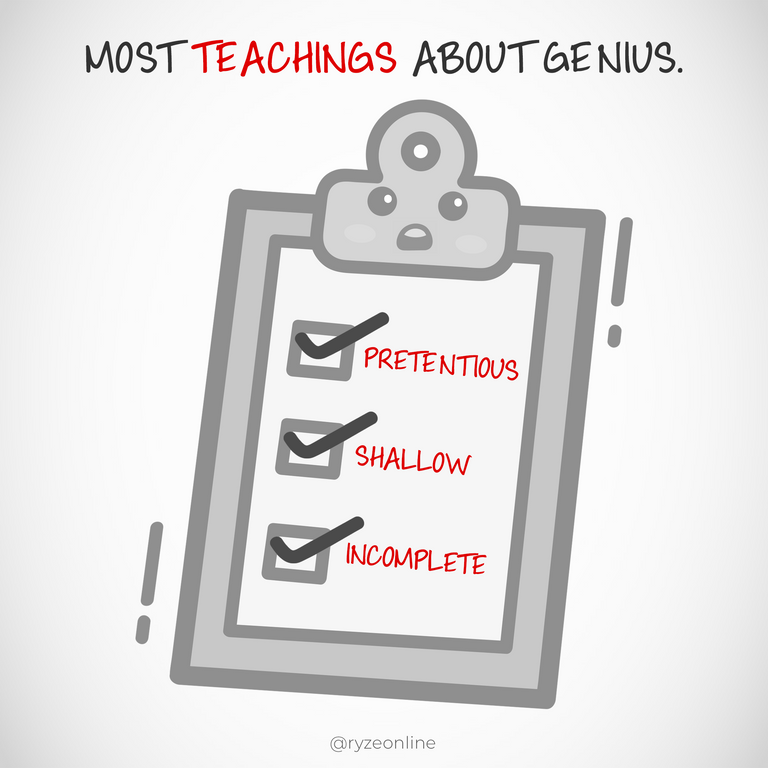
"OK, then we'll start with Howard Gardner."
"I found him already.
What can a 77-year-old dude tell me about smarts?"
"Some say a lot, some say nothing. But he offers an 'easy-to-understand' take on intelligence. It's his 'theory of multiple intelligences.' Some say he outlined 8 different types, others say 7, 9, or 10. He’s even been quoted saying there may be more beyond his original categories."
"OK, so what is this theory?"
"Gardner suggests all humans have 8 intelligences, but our ‘rank’ on each one varies."
"How can we have 8 different intelligences?"
"It all depends how you define intelligence. Gardner gives a wordy definition of intelligence, but I’ll summarize it for you. According to him, smarts is basically:
'The potential to process info used to solve (or create value), in a culture.' Got it?"
"I guess. Seems like a decent definition."
"Sure, at first glance. But a mark of most geniuses is they don't take anything at first glance. They habitually dig deeper."
"OK, so are we going to dig deeper?"
"Yes eventually, but first I'll explain his theory a bit deeper. I’ll give you a quick overview of Gardner's 8 categories, just be aware that although his ‘intelligence-types’ are popular... a lot of people disagree with Gardner’s take on intelligence."
"Shoot."
I wet my whistle before giving George the scoop.
"1. Language Smarts:
Intelligence dealing with spoken & written language. Think Shakespeare, Oprah, and Obama. Occupations: lawyers, speakers, authors, journalists, curators, etc.
2. Logic Smarts:
The capacity to analyze logically, do math, and investigate scientifically. Develop proofs, calculate well, and solve abstract problems. Think Albert Einstein & Bill Gates. Occupations: mathematician, accountant, scientist.
3. Spatial Smarts:
Recognize & manipulate objects & space. Can process large-scale and fine-grained images. Think Frank Lloyd Wright and Amelia Earhart. Occupations: surgeons, navigators, architects, and so on.
4. Body Smarts:
Using one’s body to solve or create. People with this have impressive mind–body union & mastery. Think Michael Jordan and Serena Williams. Occupations: dancer, athlete, carpenter, rehab expert."
"Wait, aren't these just a list of talents people can possess?"
"That's a valid point. When we're done talking about genius, hopefully you'll be able to answer that question yourself."
"Great, please continue."
"OK,
5. Music Smarts:
Skill in performance, composition, and appreciation of musical patterns. Able to easily manipulate musical pitch, rhythm, timbre, and tone. Think Beethoven and Ed Sheeran. Occupations: singer, composer, DJ, etc.
6. Social Smarts:
The ability to understand the intentions, motivations, moods, & desires of others, and leverage them for their goals. Think Mahatma Gandhi and Mother Teresa. Occupations: Teacher, sales, manager, PR.
7. Self Smarts:
To have deep wisdom about oneself. Using one's own desires, fears, and potential to effectively navigate life. Helps understand which life goals are important and the path to them. Think Aristotle and Maya Angelou. Occupation: therapist, psychologist, counselor, entrepreneur.
8. Nature Smarts:
Ability to recognize the many species of flora, fauna, and the natural environment. (Plants, animals, weather and so on.) Think Charles Darwin and Jane Goodall. Occupations: botanist, biologist, meteorologist, etc."
"Wow, ok, I get all eight, seems pretty straight-forward."
"Yep, there you have it. So do any of the categories speak to you? Do you feel ‘smart’ by fitting into one or more of them?"
"I feel that I'm good at all of them. Is that conceited?"
"Well, it’s good to feel positively about yourself, but it’s even better to truly know yourself. And the thing about Gardner’s intelligence-types is…
Gardner's theory is just a theory."
"K, I'm kind of embarrassed to ask this, but what do you mean by that? Like I hear the word 'theory' all the time but..."
"...but you don't really pay attention to it, right?"
"Right, I just absorb the rest of the sentence."
"Well, it means the categories I told you about are basically just an informed guess that happens to be appealing. It's a decent theory. It appeals to a lot of people. There could be many reasons for it’s popularity, but a major one to consider is that it’s a 'feel-good' theory. It feels good to see ourselves as smart. And with Gardner’s system, we can call ourselves ‘intelligent’ as long as we fit into one of his categories."
"So a theory is just an educated guess? Totally possible it's wrong?"
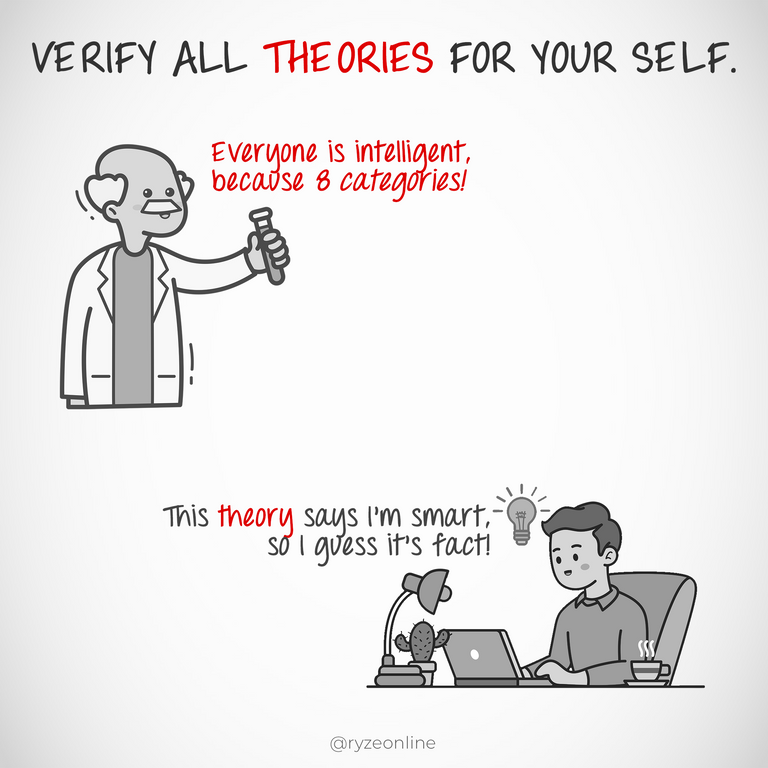
"Exactly." I felt a smirk creep across my face, but shook it off as quickly as it arrived. My 'teach with positivity and love' mantra ran through my head. "Critics of Gardner say intelligence is just ‘one thing.’ They say ‘arbitrary categories’ have no place in it. They disagree with his guess."
"Sounds like there are science-dudes on both sides."
"Correct. But scientists & intellectuals can spend years deadlocked.
Each side says 'Oh yeah? My theory’s stronger than yours!' over and over, while desperately seeking ‘definitive proof’ for their side. Gardner’s backers on the other hand argue that intelligence categories exist. Their points are full of studies, data, and statistics. But his critics do the same for their ‘one intelligence’ take on things."
"Hmm. Don't these debates drag on and on for like... years?"
"They do indeed."
"And do we get a conclusion? What do these uh, 'science battles', accomplish?"
"Not much. They’re not practical, effective, or helpful for most of us. It’s pages of debate that bring little insight. Most of the ‘studies’ are so biased, that we end up having to read them all and come to our conclusions anyway."
"I knew it! See, that's why I'm coming to you. I don't want some god-tier scientific proof for intellectuals to fight over. I want my boy J-Ryze's to shed some real light on what genius is and how I can benefit from it."
"Well, I’ll cover as much as possible. I’ll do it in the most practical, comprehensive way I can. By the end, you're going to have a better handle on genius than when you started. You’ll know more clearly what it means to you. You’ll learn how you can leverage it for your benefit, despite all the theories out there."
"Sounds epic!"
"It is! This will make you smarter about… uh… ‘smartness.’"
"What if I could jump 50 IQ points just by applying what you teach me?"
"That's a big jump, might take some effort, but it's actually a possibility."
"Dude, if this works, I'm gonna sell it."
"Careful. It’s a big claim to promise to increase someone else's intelligence, so I’m not guaranteeing anything. But I’ve personally seen people become significantly smarter from what I'm about to teach. And I'm explaining this as one path toward much higher intelligence. It’s an in-depth guide, and you won’t find better. It’s based on a simple truth:
The more you understand something, the easier it is to improve at it.
If we don’t understand the nuances of basketball, it’s hard to improve at it. But when we truly grasp the specifics of it, we can create an efficient path towards mastery. The same goes for intelligence."
"That makes perfect sense. I love it."
"And it’s important, because you’re secretly judged on your intelligence."
"Serious? C'mon. You think our waitress is judging my smartness?"
"Yep. She's judging you based on how intelligent your speech sounds, by how well-thought-out your outfit is, and soon, by whether you're smart enough to calculate a tip correctly."
"No f**king way."
"You're being secretly judged on your smarts all the time. Careers, collaborations, and opportunities often hinge on your intelligence levels. People get jobs because of how intelligent they seem. People lose jobs because of how unintelligent they turn out to be. Your reputation may be built off of how quick-witted you are in interviews. A lot of people are attracted to ‘smart’ mates with ‘good conversation,’ and so on."
"Yikes!"
"Don't worry, I’ll help you be magnetically wise."
"And just to be clear... I’m not claiming I understand intelligence better than everyone. But I do understand it better than most. And more than that, I’m a skilled teacher. And everything I’ve read on the net so far pales in comparison to what I'm about to tell you. So if you’re ready to truly ‘get wise’, let's continue."
"Dude, I can tell already you know a lot about this. I'm so psyched, please keep going!"
"Ah, ah, ah, not so fast. Things are going to get pretty intense.
If you're not open-minded, please stop here."
If you can't handle some controversial ideas. We'd best stop. If you think cussing has 'no place' in discussions of genius, this isn’t for you. If you can only respect ideas when they’re ‘peer-reviewed,’ this isn’t for you. If you need 10-cent words like 'pronounced socio-cultural determination,' this isn’t for you."
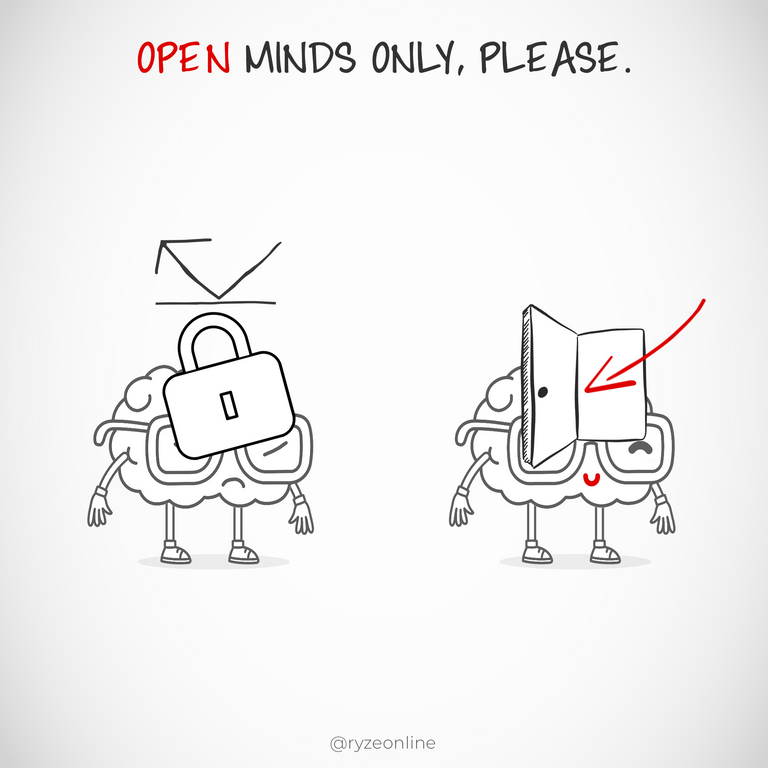
"C'mon bro, remember how I hung around even though Khalil stormed off 'cause you dropped some real talk on gender? I'm open-minded and ready for this."
"Good, since you actually want real talk from someone who cares, this is for you."
George clapped.
"One more warning though..."
"About what?"
"You may question your own intelligence once you're done learning."
"Hah. That’s probably a good thing. The smartest people are always curious, questioning everything. They’re always seeking new ideas."
"Very true."
"EVERYONE IS BORN A GENIUS, BUT THE PROCESS OF LIVING DE-GENIUSES THEM." — R. Buckminster Fuller
"So, I know you're not familiar with my whole story. I'll give you some background. This was my journey.
From a judgy genius to a blessed brainiac.
When I was young, I was officially tested and placed into a ‘gifted’ school.
I spent my youth in accelerated classes with other ‘smart’ people. I used my smarts to become popular with all the cliques, but secretly I thought I was better than everyone. I judged pop culture. I judged the masses. I judged my friends. And because I could run ‘mental circles’ around most people, I assumed I was better than them. Getting a high-paying job straight out of high school only made my ego worse.
Without sugar-coating it, I was an a$$hole. Specifically a narcissistic, entitled, self-righteous mega-a$$hole. But no one could call me on it. If they did, I’d ‘outsmart’ them during the conversation and come off looking pretty good. Deep down they’d feel that I was behaving poorly, but they could never articulate it or pin down exactly how."
"Holy crap dude. This is nuts. I had no idea you started out, so uh, mean."
"I used my intelligence to manipulate and destroy.
And I didn’t even realize I was doing it, because I was blind to most of the consequences.
Until life humbled me, hard.
I went from acing gifted classes to being a homeless, depressed, suicidal failure. I lost my girlfriend, best friend, & family. And although I kept up my entitled ways for a while, raging against the unfairness of life… the truth is I deserved my dark years on the streets.
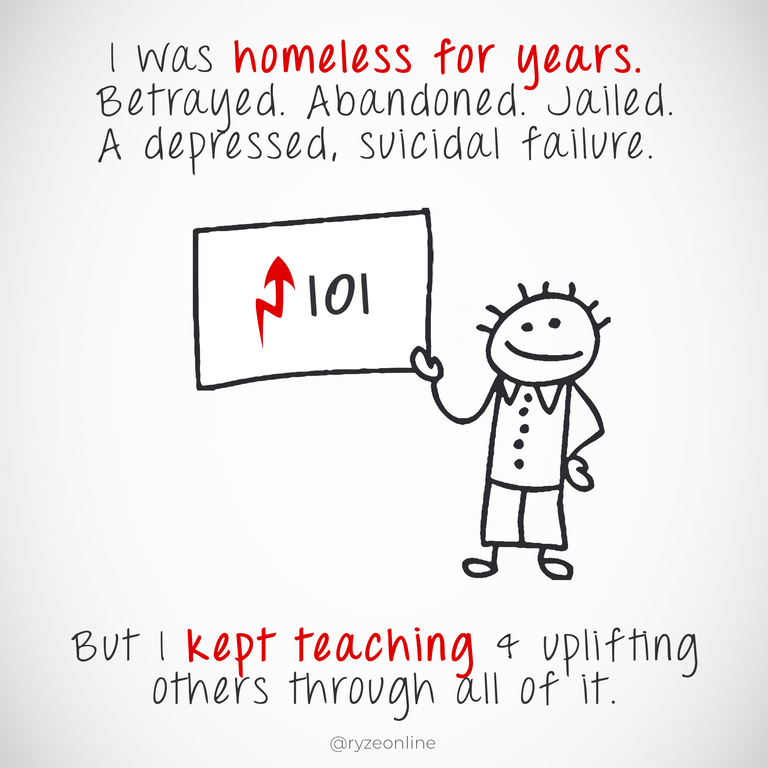
Now I’m thankful for them. They sanded off a lot of the edges of my personality. They made me hyper-sensitive to ever having such an arrogant approach to life again. My failures humbled me into using my intelligence in more loving, productive, helpful ways. They woke me up to ‘karma’, and helped me care more about having integrity than impressing society."
"Crazy. I love how you're able to see this stuff as a positive. What happened next?"
I folded my failing businesses and began giving wisdom and insights away freely. And that simple act started a chain-reaction that got me back on my feet. I ended up as a right-hand advisor to (celebrity entrepreneur) Evan Carmichael for about a decade. He valued my input deeply, and we basically built a mini-empire together.
He wasn't the only one though.
I kind of became the 'answer man.'
I answered a lot of questions for a lot of people.
The asker had to be cooperative, sincere, and receptive to the answers, but as long as those bases were covered… I delivered insightful answers to all kinds of questions. But don’t take my word for it, check out some of my testimonials:
J-Ryze, you should write a book called, 'How to Ask Better Questions'. - Denise Urena
[Jay] gave me two epiphanies I'd been waiting for for years. - Benjamin O. Jenks
You are seriously like the pimp-ass mack Daddy of coaching. - Eyenie Schultz
"Why am I telling you all this?"
"So you’ll know where I’m coming from. So you’ll understand why I’m such a passionate teacher. So you’ll get why I care about intelligence so much, and why I have a lot to offer here. Much of what has been written on genius is boring, as you already told me."
"Yeah, and if you don't get to it, this is gonna bore me too!" George nudged his plate of fries towards to take the edge off his playful threat.
"My point is that most pieces on genius rarely persuades anyone to a helpful perspective. And the thing is...
Persuasion actually beats smarts."
"You think?"
"Yep, unless part of your smartness lies in the field of persuasion, anyway. Think about it.
I’m not sure what Donald Trump’s level of intelligence is, but I’m sure he’s above-average at persuading the masses. Muhammad Ali wasn’t exactly mensa-level, but boy could he charm interviewers and fans. Beyonce’s reasonably intelligent I’m sure, but I’d bet a sway of her hips and her million-watt smile gets more people supporting her causes than her dropping some well-reasoned logic does.
And that’s ok. I get it. Agreeing with charmers feels good. Believing in things we want to believe is easy.
"Sigh. Yeah. Meanwhile, critical thinking takes substantial effort."
"Well said! And society has raised most of us to avoid effort. This creates an interesting situation where the loudest & brightest in our society are those who charm us into agreeing. They shut off our analytical minds. This leaves us with a noisy, flashy, dumbed-down idiocracy, where the smart people are all but invisible.
So although I’m eager to share the interesting ideas I have about society’s wisest, most people would rather just be persuaded to join a cause. They'd rather be persuaded towards gossip, drama, or escapism. What are the chances a conversation like we're having here gets the attention of the ‘mainstream?’ The masses aren’t intellectually curious. They're not good at pattern recognition. They're rarely perceptive. Which means…
Noticing intelligence is hard for the masses."
"That's a pretty grim picture, my guy." George's face recoiled at the mental image I was painting. "Are you saying--"
"Yes. Society can't see smart people.
And most people confuse ‘smarter than average’ with ‘genius.’
This is because it takes smarts to properly assess another person’s intelligence. So if someone ‘thinks like us but a bit better,’ society labels them smart.
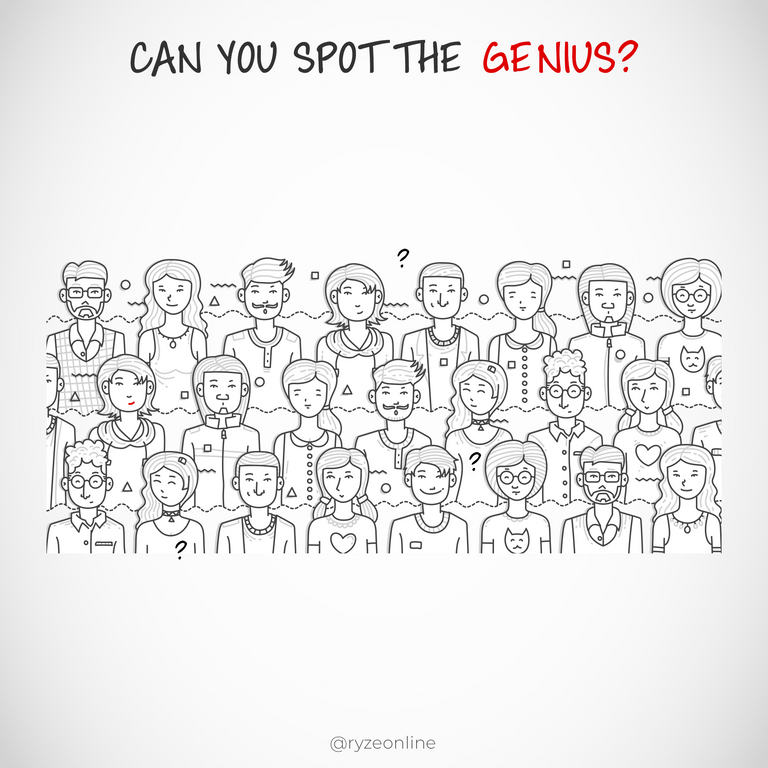
But the truly smart think nothing ‘like us’. They talk differently too. It’s been coined ‘communication range.’"
"What's that?"
"Communication range was originally found by researcher Leta Hollingworth, then popularized by Grady M. Towers. It means that people with a high IQ think so differently than others, that 'meaningful communication' isn’t really a thing. It’s like a man talking to an ant. Things like small talk & customer service are doable, but truly meaningful communication isn’t possible. This is why marriages are happiest when the IQ of the spouses is close.
So although we’re all speaking ‘English, smart people just seem like snobby nerds, and lesser-thinkers just seem like dumb plebs in return. And instead of seeming smart, the intelligent are often labeled weird, odd, eccentric, sharp, or overly serious instead.
Average-minded people just don’t (yet) have the ability to recognize a smart person, even standing next to them. It’s easy to ‘detect down for intelligence, but not to ‘detect up’. And there’s something that makes it all even trickier.
The truly smart people have been trained to hide."
"I've never thought about any of this stuff. Why have they been trained to hide?"
"Why wouldn’t they?
Let's examine the world's track record.
How many wise souls have been assassinated?
Gandhi. Martin Luther King. John Lennon. Tupac & Biggie. The list goes on. Were these people incredibly smart? Depends on your definition. Whatever the case, they spoke uncomfortable truths. They offered wisdom that ran counter to the prevailing culture of their time.
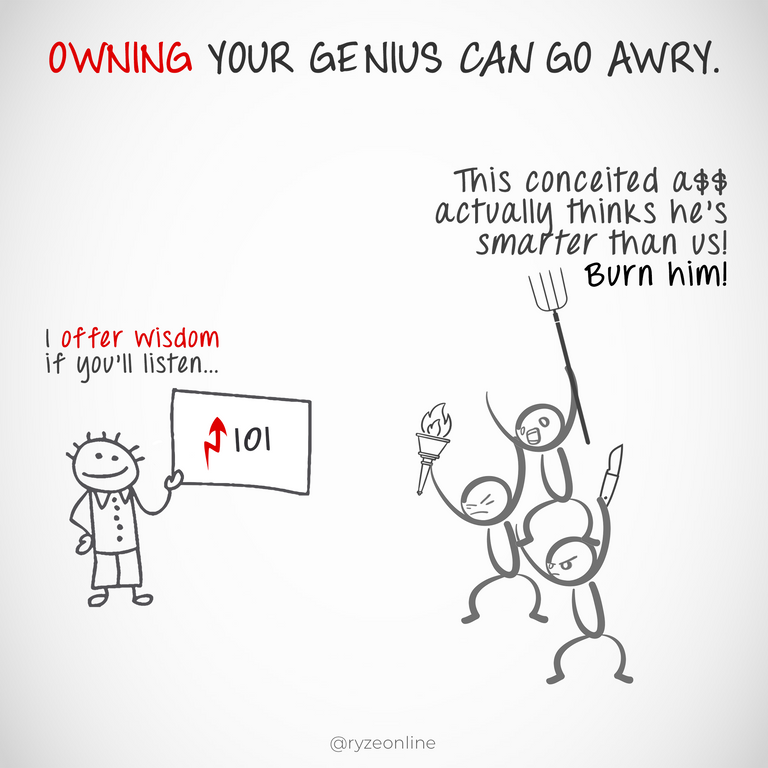
They were shining lights, clearly elevating society with their contributions. They 'shouldn’t' have been killed, but they stood firmly for what they believed in. They drew the ire of 'average-minded' groups and individuals, and were taken out for sharing their perspectives.
These examples would scare away most smart people."
"Totally. They actually scare me too. I don't want to live in a society that murders our brightest lights."
"Smart people would likely agree, so they simply avoid all attention. The wise often understand truths about life the average person doesn’t. They often want to contribute their ‘secret knowledge’ to society. But it’s a tough choice. Do they share their ‘controversial’ truths with average minds and become targets? Or do they keep to themselves, sit on their wisdom, and attempt to sneak through life unnoticed? It's common for smart people to see society’s clearly violent track-record towards new ideas and just opt out."
"It’s unwise to poke your head out when the missiles are firing."
"Hah! Perfect metaphor, George. Yes. Anyway, we’ll revisit how to spot smart people (if it’s even possible), and how to bring them out of hiding later. For now, I’ll tell you about a little ‘game’."
"Haha, like... a smart people game?"
"'Whoever is wrong first wins!'
OK, they don’t call it that. And they don't play this exactly. But they do realize that defending wrong views helps no one. They know that changing their mind when new data arrives, is victory. They know it’s not a good look to be doggedly hanging on to a weak view. So, smart peeps are quick to admit when they’re wrong. Admitting wrongness is a key step towards becoming even smarter, and it's how they play the game.
Defending our wrong-headed opinions is the number one block to discovering truth.
To be smart we must be open-minded, eager for truth (even if it hurts,) and quick to admit the second we realize we’re wrong. About anything.
And as we talk, you're going to get chances to play this game, just like geniuses do. Something I say will challenge one of your beliefs.
You'll get to prove how smart you are by how quickly you ditch old views."
"Puh-leeze. You in trouble, 'cause I rock at games."
I snatched a fry off his plate. "This ain't League Of Legends, homes."
"We'll see. I can admit I'm wrong and change my mind."
"Good. 'Cause geniuses are good at changing their minds when they learn something new.
For example, here’s a view many people hold. 'Celebrities are smart.' People don't say this out loud, in fact, they even say the opposite. But if you watch they're behavior as they copy their favorite influencer or guru, their belief becomes obvious.
And so, believing this, they take every word their favorite celebrity says as gospel. They ‘buy-in’ to every idea their idols are selling. Is this really a behavior worth holding on to? Or is it better for them to admit they're copying un-smart people, and to change their approach?"
"Hmm. You're right, loads of people look up to celebs."
"Yeah, which makes 'popular' beat 'smart' in our society."
In fact, as we talk together...
Compare what I explain to what the big famous personalities are saying.
Compare what I teach to what Jordan Peterson says about intelligence. Or to what Oprah says about intelligence. Or to what Will Smith says about it. You’ll see what I'm teaching is better."
"Bragging ain't a good look for you, broseph."
"Ugh. I'm trying to make a point. See? This is what I meant earlier. A smart person is trying to teach an important idea, and all the listener can do is project onto them and nitpick delivery while missing the actual point! Gah, it's so annoying."
"Yo, homes... chill. I was one-hundred-percent joking. Who's projecting now, smarty-pants?"
"Oh. Ah. Snap. My bad then. I mean, I'm just triggered because anytime I try to point out that I might be worth listening to more than some random celeb, people call it bragging. I guess it goes to show you that no matter how smart a person is, we all have similar flaws and foibles that can throw a wrench in our communication. I apologize for snapping."
"All good. I feel you. For the record, I dig what you're putting down, and I know it's fire."
"Thank you! But most people would still rather hear from their heroes instead. Even though the gurus, experts, and influencers they look up to don’t have much to offer on the topic of intelligence. They’re just who are good at their particular craft. They’re good at charming people. They’re good at catchy soundbites. And though those things require some intelligence, they don’t make society's idols truly wise.
And it especially doesn’t make them great at teaching.
Most don’t teach intelligence insightfully. So if we’re looking for a deeper understanding of ‘smart’, we’d best be careful listening to most celebs. I’m not saying that no famous person has anything of value to say — of course they do. Plenty. I’m just saying do your research by going beyond what you hear in popular media."
EVERYTHING POPULAR IS WRONG. - Oscar Wilde
"Basically you're saying 'celeb doesn't equal smart,' right?"
"Rich is not smart.
Ever notice that we often assume since a person is rich, they acquired that wealth because they’re smart? There’s little evidence for that. Some people get rich from luck. Others through hard work. Others through ‘law of attraction.’ Others because they happen to be excellent salesmen. Others inherited wealth. At the same time, some of the smartest people struggle to sell their genius ideas, and can’t make money from them. (Study Nikola Tesla for more on this.)
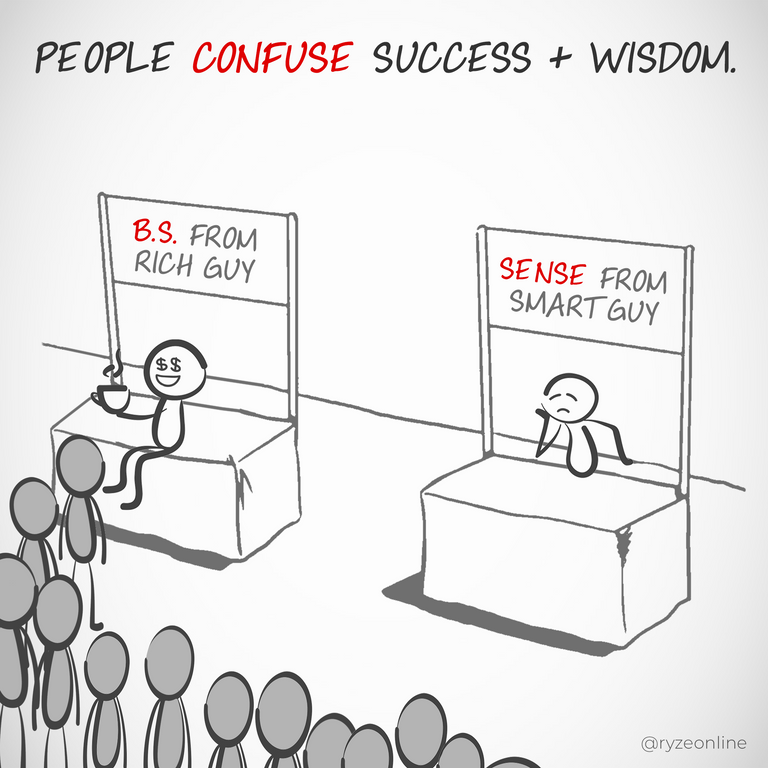
Famous is not smart.
Similarly, we assume that if somebody is famous, they’ve gotta be smart, right? Nope. They could be charming or persuasive only. They could have a team of smart people behind them. They could’ve just been at the right place, at the right time, in front of the right journalist. Fame comes in many shapes and sizes, and I’m not sure any of them are related to intelligence.
Beautiful is not smart.
And beautiful people are often given special treatment. I’ve seen plenty of guys blindly agree with things a beautiful woman says. I’ve even seen them defend a model’s factually incorrect views, simply because they’re enchanted by her beauty. Being beautiful can come from genetics, focused nutrition and exercise, fashion, make-up, and more… but it certainly doesn’t mean someone is automatically smart. It doesn’t even make it significantly more likely.
"Now that I think about it, it's nuts how often society sees someone talented in one specific area of life, and just assumes that person is truly smart."
George and I sat in silence for a moment, giving this thought room to breathe before I continued.
"Yep. Things like riches, fame, and beauty might be indicators of intelligence. But they’d be weak at best, and usually steer people wrong if anything.
And the reverse is true as well.
Say you meet a smart person. Their intelligence is no guarantee they’ll end up rich, famous, or beautiful. But it does enable them to learn to be those things, should they put their mind to it.
For example:
Have you ever heard of...'smart fools?'
Have you ever met someone who seems smart, but makes foolish decisions?"
"Totally. I'd almost say my sister is in this category. I mean, she's brilliant, but makes so many bad decisions, in my opinion."
"I hear ya. I did the same thing in my younger years. This can happen for many reasons. It may be immaturity. It may be part of someone’s 'life-path' to make some f**k-ups. It may be a ‘condition’ of some kind. It may be emotionality clouding things. The point is, be careful writing off a ‘bad choice’ here or there as a sign of stupidity.
"So it’s better to observe behavior over time?"
"Yes. Observe as long as you can manage, before labeling a person ‘smart’ or not.
Precocious youth director David Lubinksi says even that may be unreliable. He says if someone is smart, that’s just like owning a car with a powerful engine. He says 'if there’s no gas in your car you’re not going to go anywhere. If road conditions are bad, you’re not going to go anywhere.' Can you tell me what he's getting at?
"Intelligence must be applied or it’s useless?"
"Spot on. This is why we need thinkers, do-ers, and most importantly, hybrids who do both. We need people who think clearly and execute well."
"Bro if you want to compliment me, just come out and say it."
"Hah. Yeah you're obviously what society needs. You think about getting us more beers, and then you do so with style."
"Excuse me? Did this tutorial just turn into me buying the next round?"
"Don't you think what we've covered so far is worth a pint?"
"That and more, heh heh. OK, I got this."
George did his best to flag down our lovely waitress, Steph, while I continued rambling.
"In reality, most of society is more do-er than thinker. They focus on action more than the critical thinking that is meant to be done first. I want to make a giant billboard...
Calling all thinkers: we need you.
Action without forethought tends to go poorly. It has its place, sure, but usually ends up in less-than-pleasant results. It leads to mistakes, mishaps, and chaos. But learning by blind trial-and-error is sometimes effective. Action and doing are often very valuable.
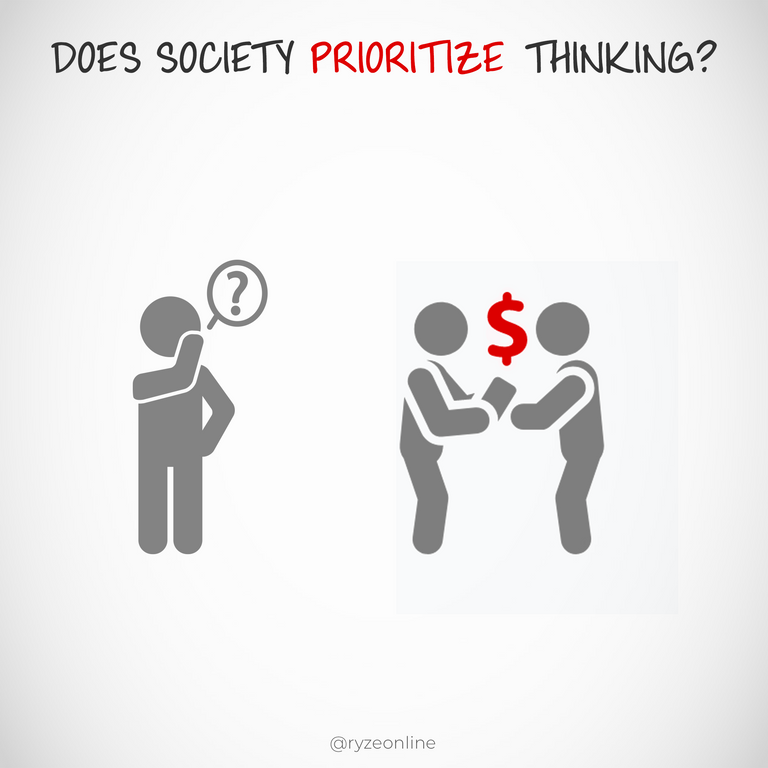
Because being entirely a ‘thinker’ isn’t smart either. But if I had to advise people, I'd advise them to practice their thinking skills over their 'doing' skills. The world has more than enough 'do-ers' who plunge ahead thoughtlessly. It has plenty who put their emotions ahead of truth, or what’s best for humanity."
"Yeah, I agree. Lack of smart choices is probably why so many of the world’s biggest problems still exist."
"I second that. It’s why very little headway is made, generation after generation. Zero long-term thinking. Minimal smarts. The world could use more good-hearted, critical thinkers. And I don’t just mean self-proclaimed ones. I’m talking about the truly wise people. So I keep feeding my mind well and teaching what I’ve learned. Basically, I aim for a healthy mind, and I hope you do too."
"I'm here aren't I?"
"Fair enough. But everything I've said raises a pretty jaw-dropping question."
"It does? What?"
"Are fat people worse than thin ones?"
"Duuuuuude!" George's eyes bugged out and his mouth opened loosely. "You can't say that sh*t! Look at the table next to us!"
"Chill. I adjusted my volume, no one heard. And even if they did, so what. It's just a question."
"Yeah but--"
"--An offensive question, I know. But I’m asking for a reason. There are similarities between intelligence and nutrition. Both are essential for personal health and longevity. Both are instrumental in advancing humanity. Both are heavily judged by others. You can feed your body with non-ideal nutrition, and you can feed your mind with non-ideal info."
"Oh... damn good points. Ok, I'm interested. What else?"
"Well, let's explore."
Let’s say we have two people, Joe, and Jane. Does it matter if Joe binges ‘fluff’ all day long? Does it matter if he has zero intention of self-improvement? And learns next to nothing from his journey in life? Does this make Joe ‘worse’ than Jane, who feeds her mind with the highest quality wisdom she can, and who changes her mind anytime she sees she's wrong?
That's their mental-habits. And Joe & Janes habits matter in nutrition too? Because surely, the world makes room for all body types & eating-plans, right? So, surely it makes room for all intellect-types and education plans too, right?"
"I guess? I mean, I'm tempted to judge Joe, he sounds like an unintelligent unhealthy person."
"Sure, but are you saying there's no place in society for someone less smart, or less healthy? Remember 'spectrums' from the beginning of our chat.
"Hmm. OK, well, I guess it’s not so much that one type of lifestyle is worse than the other, but I still see it as problematic."
"Better approach. And the problems arise from denial. For example:
If I’m overweight, obese, or unhealthy… I need to admit it, rather than paint a happy face on it and claim I’m slender and fit.
So I make sure I admit it.
The same goes for intelligence. To have a higher quality of life, it’s key that we admit where we are. Admit our 'mental-fitness' the same way we admit our physical fitness. There’s no shame in it. Un-smart people aren’t worse than smart ones, the same way fat people aren’t worse than thin ones. All that matters is we embrace where we’re at in life. Then, either accept it, or change it."
"Wow. This is the least judgy approach I've heard."
"I'd take a bow, but these booths are more cramped than I expected."
"I'll give you the chair next time."
"You're too kind."
"OK, so what actually is smart? We've talked for half an hour and haven't even defined it."
"I'ma be honest. Mountains of research has been done on what ‘smart’ is and how to measure it. And all of it is inconclusive. You could probably study it for a lifetime and still not fully comprehend it. Humanity’s best and brightest are still only guessing."
"So it's hopeless to even bother?"
"No, it’s totally ok. Because like electricity, not fully understanding intelligence can’t keep us from its benefits, at least enough to make our lives better. Hollywood movies convince us intelligence is one thing. Grades teach us it’s another. But don’t buy into the stereotypes.
It ain’t geeky, glasses-wearing reader-virgins."
"Then is it IQ? EQ? Memory? Is it something in our brain? Soul? Is it magic?"
"All good questions. Most definitions say intelligence is something like:
'The ability to think, learn from experience, solve problems, and adapt to new situations.'"
"Doesn't say anything about IQ..."
"Good catch. IQ is the most common measure of intelligence, and many psychologists are passionate about it. They relate IQ to brain volume, neural speed, and memory capacity.
Personally, I wouldn’t trust an IQ test (despite scoring highly on them). There are huge variations in the test results because of culture, genetics, testing practices, and more."
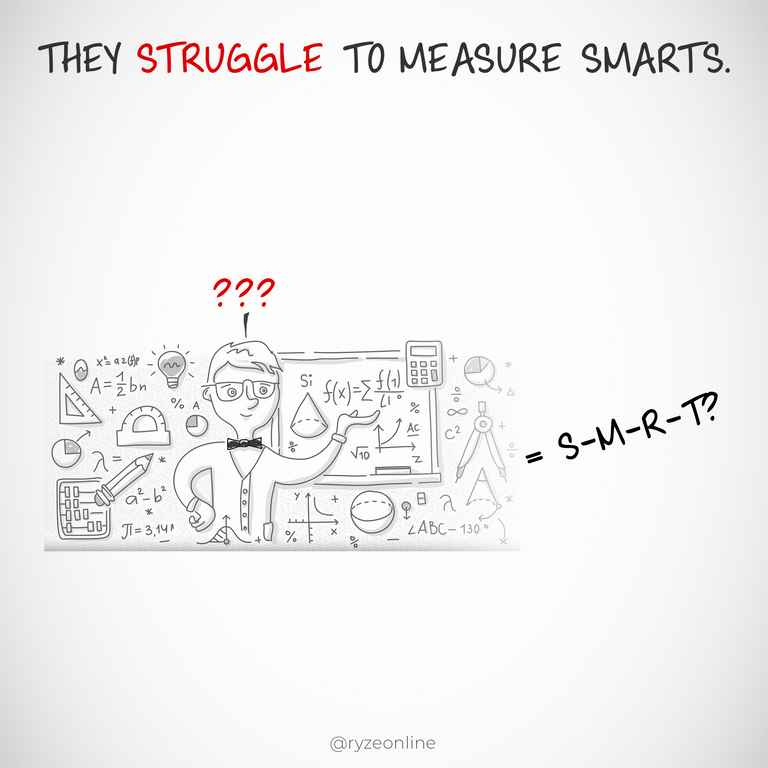
"Are none of them any good?"
"Two supposedly fair intelligence tests are Cattell’s and Raven’s. These tests focus on measuring 'g', or general intelligence, rather than specific skill sets. But even these tests aren’t that appealing.
For example, researchers have noticed lower IQs appear to be linked to felons and higher IQs seem linked to wealth. But it’s just something that seems to be linked. It’s not ‘hard science’ or anything. ‘Links’ can come from anything, environment, culture, upbringing, genetics, who knows.
Scientists run study after study, but they almost all use the word ‘correlational.’ Correlation can be a very helpful thing, but usually just means 'X seems related to Y, but we’re not really sure. Plus, even if we are sure they’re linked, we have no idea exactly how or why.'"
"Sounds like science is spinnin' their wheels."
"Sometimes they are, sometimes they aren't. Science is amazing, and we owe much of great mdoern life to work done in that field. That said, after centuries they still don't understand electricity, consciousness, and many other things humans use naturally in our day to day lives."
"And I gather that human intelligence is in that list too."
"Yeah, for the most part they're just banging their heads against a wall trying to measure intelligence."
Still, science continues doing its adorable best to measure it.
In fact, science is so obsessed with ‘measurements’ that they often miss the forest for the trees."
"How so?"
"A scale reliably measures weight. A watch reliably measures time. But not even our best IQ tests measure intelligence in a useful way at all. And it’s been like that for ages.
And even if we could measure intelligence, is there a difference between it and wisdom? Or intelligence and creativity? Are they linked? Are they created by nature? Nurture? Both? Are intelligence tests biased by years of racism, classism, sexism all tied to agendas about 'who is smarter than whom?' The questions spiral on."
"Whoa, whoa, whoa. Hold on a second. Something you said just blew my mind."
"What part?"
"Can we tell the difference between wisdom vs. creativity vs. intelligence?"
"Ah yes. Well, although intelligence, creativity, and wisdom may appear to be similar, there are differences. But it's tricky to talk about because many definitions of each term differ. So here’s my best explanation of the three:
Intelligence
Intelligence is hyper-rational, data-based, and focused mostly on our immediate environment. It’s IQ, logic, and related analytical skills. Convergent, it narrowly focuses on ‘right’ answers and scores highly on tests. Does best with well-structured problems to solve. Responsible for scoring highly on ‘tests’ given by others. Generally unoriginal.
Creativity
Creativity gives a novel, surprising, and useful idea. Divergent, it often connects distant concepts and embraces multiple ‘right’ answers. Does best when problems are ill-structured. There are as many ways to write a novel as there are novelists. The same goes for painting and artists. Inventions and scientists. And there certainly are no clear paths to it. Unfortunately, few people find any path at all. Often original.
Wisdom
Wisdom seeks the common good. It does this by balancing our interests with society’s and the globe’s, both long- and short-term. It’s dialectical (ie: ‘merges opposites’). It’s positive, contextual, and all-encompassing. Wisdom does best with moral quandaries, higher-order thought, and resonant truths. It’s self-aware and ethically aware. Original & elusive."
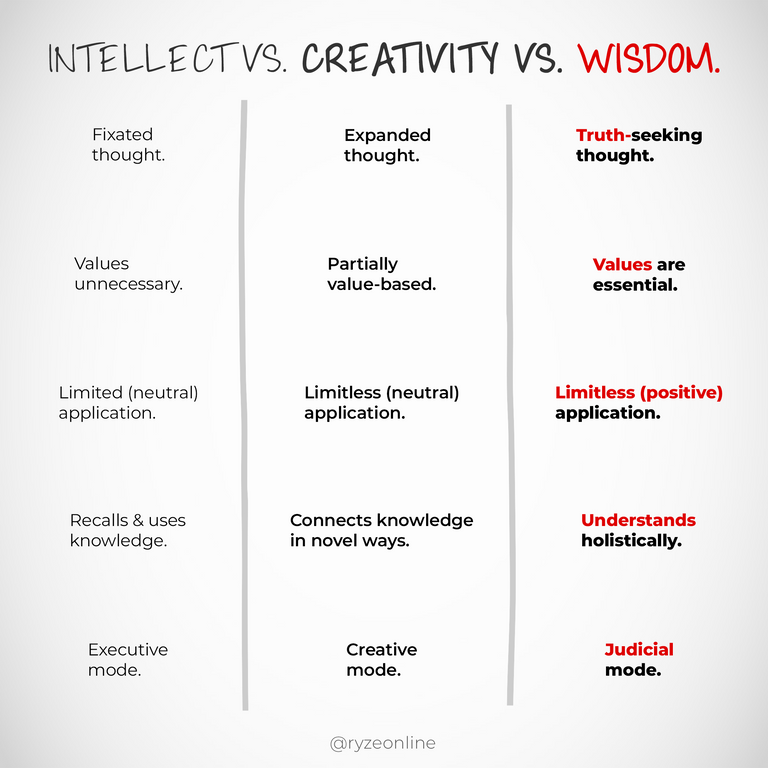
"Clear?"
"Um... yes?"
"Prove it to me. Can you sum the three up?"
"You mean that being an intelligent person doesn’t guarantee you’re a wise person. And being wise doesn’t always guarantee intelligence. And neither guarantee creativity. But they’re frequently found together. I'm just not sure why this all matters?"
"Because what we measure as intelligence isn’t enough. IQ isn’t enough. 'Having a great intellect is truly smart,' you say? Hardly. Because we’d still be Neanderthals were it not for human creativity. Not to mention, we’d have more World Wars without wisdom.
All three of these thinking approaches are necessary to make up a truly great mind. So what are the chances someone scores highly in all three areas?"
"Not great from what I've seen." George guffawed, proud of his line.
"Exactly. That’s partly why it’s hard to spot true geniuses."
"INTELLIGENCE IS NOT THE SAME AS WISDOM." — Lao Tzu
"So maybe I've seen it and not realized it?"
"Yes. Most people think they can spot true genius."
"Give me an example?"
"George, you see it all the time. People labeling ‘smart’ or ‘average’ or ‘stupid’ in a heartbeat. As if they’ve been studying intelligence for years, and they know exactly which is which. Often, when an average person sees the following, they conclude their target is likely to be smart:
Complex Speech
Wrong. Truly smart people realize that communication is important. They realize that clarity is vital. They realize that showing off with ten-cent words and spewing jargon is bad. They get that it hinders communication, not helps it. Smart people simplify things for others, not complicate them. If someone relies on big words or complex concepts, they’re not nearly as smart as they think. But they’re probably desperate to seem so.
Edgy Loners
Wrong. Most smart people manage to develop a ‘secondary persona’. One that helps them to ‘get by’ and interact with others. They’ll often appear to be as ‘normal’ as others because they’ve used their intelligence to blend in. But it’s uncomfortable to ‘dumb down’ their thinking for too long. So they may retreat from society to recharge. They may hang around a very select circle of friends who let them be themselves. This brings us to the next thing people think is an indication of wisdom.
No Small Talk
Kind of. It’s fairly common in smart people. Conversation is valuable. Words are valuable. Air-time is valuable. Smart people understand this and make sure not to waste bandwidth on fluff that accomplishes nothing for themselves or humanity. This doesn’t mean they don’t have fun, or make jokes, it just means they avoid meaningless gossip, drama, and hyper-obvious statements."
"Hmm, I've made assumptions about this stuff before. Especially the complex speech one."
"Oh yeah?"
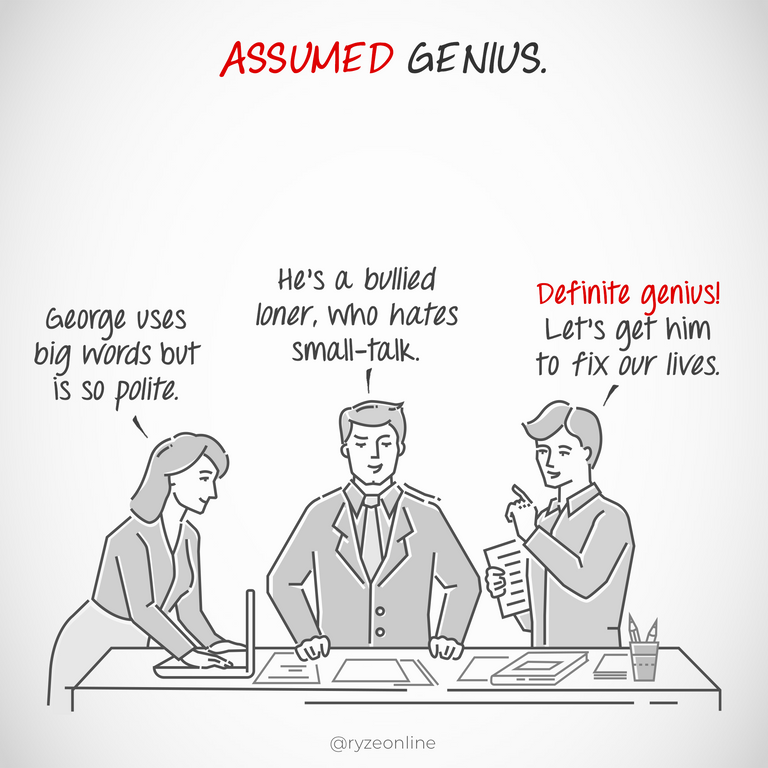
"Yeah, just yesterday when I was researching this, I found a post from some professor talking about all his experiments and hypotheses and statistical derivations and whatever, and I was just like... this dude's way smarter than me."
"Well, at least you can admit assumptions, that's a huge blessing. Anyway, there's a few other common things people see and assume smartness on."
"Such as?"
"Get Bullied
Not exactly. Many smart people do report being bullied. This is because when a dumb person meets a smart one, they only have two choices. A. Humbly learn from them and try harder or B. Belittle, dismiss, and laugh at them. And since most people would rather die than admit someone else is smarter than them, they often choose B. But this still isn’t a good indicator of intelligence, because all kinds of people get bullied for all kinds of reasons.
Mr. Fix-It
Wrong. Oftentimes people are deemed smart because they accomplish tasks for others. They’re the “go-to” person. But just because someone is competent at something or even many things, doesn’t mean they’re intelligent. Perhaps they’re just a people-pleaser. Perhaps the tasks are hard for them, but they do them through force of will. Perhaps they have a knack for it. While smart people are often good across multiple fields, this still isn’t a good indicator of intelligence.
Polite = Smart
Wrong. Many consider calm, polite people who don’t ruffle feathers… “smart”. And while it’s true that intelligent people lean towards civility and emotional control, there’s plenty of polite, kind people who would be tough to call smart. And some pretty mean people could be called ‘dumb’. I haven’t explored why polite people are sometimes labeled as smart, but let’s just say this isn’t a reliable sign of genius.
The point is, a lot of people think they can spot genius, but they can’t.
Which is probably why scientists keep trying to come up with ‘tests’ for it."
"So I guess that brings it back to IQ after all. That's what science is all about, right? Thoughts?"
"People who rely on IQ scores aren't very smart."
"Damn dude. That's cold."
"Well, not all of 'em. But intelligence, wisdom, and creativity are so vast, that testing for them seems... silly. It’s like making a person do exercises to figure out if they’re going to 'go Columbine' on society. We simply don’t have tests that can determine this.
But IQ is still kind of helpful.
"I thought you said you hated it."
I curled my lip and squinted. I hoped George wasn't gonna call me on every turn of phrase or emotion I expressed during our talk, but I pressed on.
"I mean... IQ is just... 'meh.' You know? It can help a bit, as long as you take it for what it is. The problem comes when we hyper-focus on it. That’s when people quickly divide into extreme sides."
"What are the sides?"
"One side claims IQ is meaningless. They believe smarts relate to career, academic, or life success. (e.g., Howard Gardner, Robert Sternberg). The other side claims IQ is absolute. They believe intelligence is one over-arching factor that can be measured. (e.g., Charles Murray, Jordan Peterson). The truth is probably both. IQ is more like a measurement of a car’s horsepower. While horsepower is a helpful number, it’s bad for predicting race-winners. Experienced drivers know racing relies on torque, handling, and tire friction. They know it takes technique, track-familiarity, and more. A huge-horsepower dragster is impressive, sure. But it’s useless, even harmful, outside of a drag-strip.
“He stressed…the remarkable diversity of intelligence and the… need to study it using qualitative… not quantitative, measures.” – Alfred Binet, inventor of IQ.
Besides, IQ is measured against a population. It can’t be measured by arbitrary tests created by one culture. It’s unreliable as soon as it’s applied to members of another culture.
The point is people who think IQ measures intelligence are wrong. It doesn’t. And it’s futile to track the many traits of intelligence into a manageable score. It’s like trying to score a person’s “level of faith” or their “feelings about life”. To argue that all smartness that matters is measured by IQ tests is silly. Society has been sold this myth ever since the first IQ test.
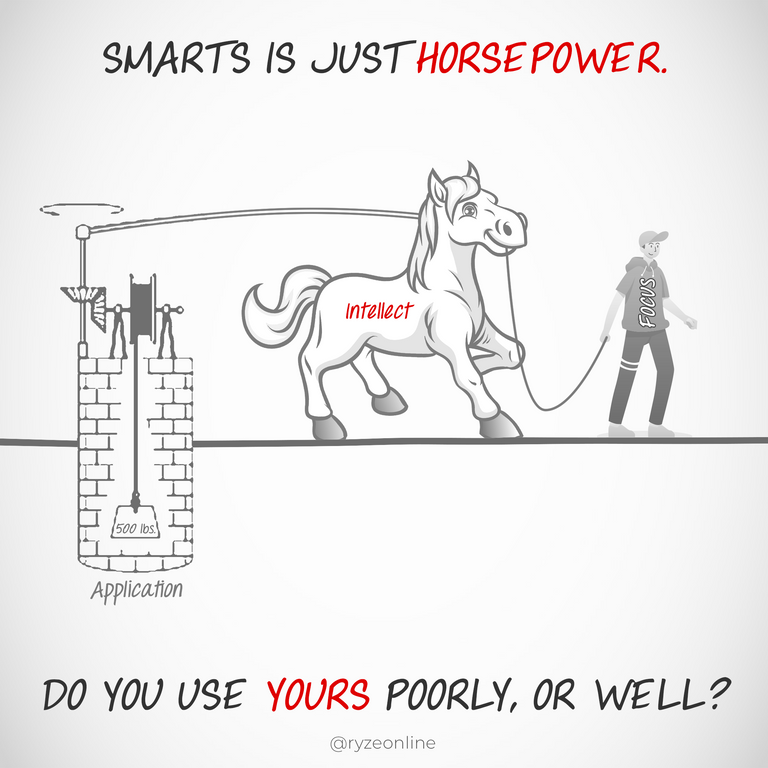
So it’s best to mention IQ about as often as you’d mention horsepower.
"So then what should we discuss instead? I was reading and saw some people talking about something called, um, 'g.'"
"Lately science has been fiending for g."
"One letter? WTF, was 'eye queue' too long for 'em, hah."
The g factor is what modern science sees as ‘intelligence’. It’s the main thing modern IQ tests are ‘measuring’. The existence of g is based on a bunch of fancy math words like ‘variance’, ‘correlation’, ‘unitary’, and so on.
Basically, it’s all statistics, and statistics aren’t facts.
They’re not rules. they’re probabilities. IQ tests measure three things. Mainly g, some non-g intelligence traits, and ‘uniqueness’. Are these tests truly measuring some unseen, untouched ‘intelligence’? Many scientists say yes. They believe g is measurable. They’ll tell you there’s “substantial evidence” g exists. But it’s kind of like arguing over the existence of God, or ghosts, or meaning in life.
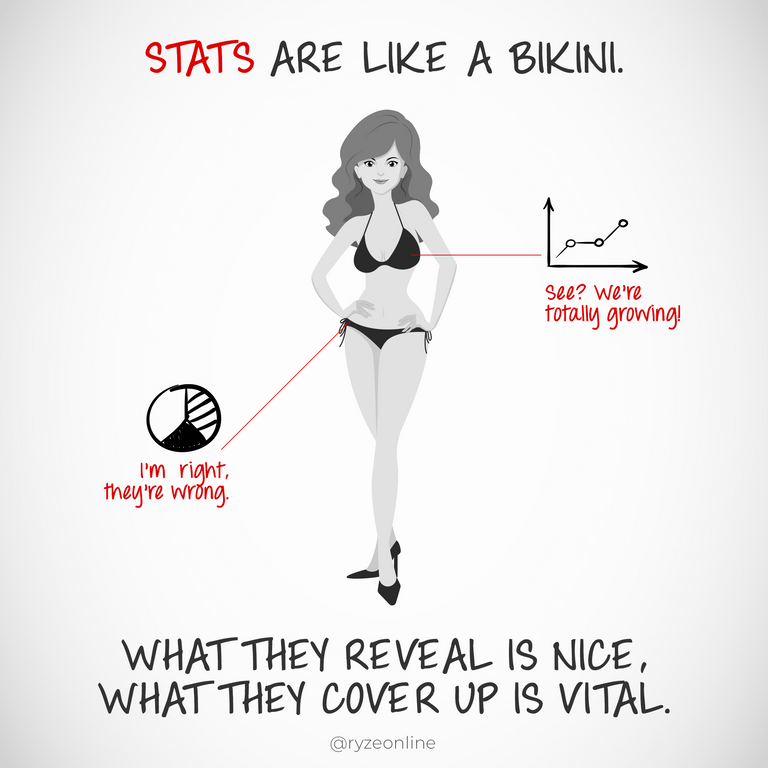
George, does God exist?"
"OK, shit just got real. You wanna light up a joint and contemplate the universe? I'm not sure the restaurant would go for it, but our waitress Steph would prolly be down."
I ignored George's rapier-wit. "Do ghosts exist? Does meaning? Does anyone have conclusive proof? Does any of it really matter in your day-to-day life?"
"Not really..."
"No, it doesn't. Same goes for g. It doesn't matter if it exists. What matters is that you have enough understanding of smartness to benefit from it.
Can g predict whether someone is smart? Can it tell who will become smart? Can it tell who’ll apply their smarts? If it could, money would be flowing. Corporations would pay millions, leveraging g to get bright minds on their payroll. Many of the world’s best minds haven’t even been tested, and may never be. Einstein’s IQ was never tested, but the dude was clearly brilliant. And if you couldn’t tell that by talking to him, it can be seen by his results. You don’t need a weigh-scale to tell if a woman is beautiful, and you don’t need a g-test to know if someone has a beautiful mind."
"Damn, spit that fire, son."
“Not everything that can be counted counts and not everything that counts can be counted.” – William Bruce Cameron
"So to your question, should we talk about g instead of IQ? I recommend avoiding both. They’re both for average minds in the science & math community, and will get you nowhere.
It’s for people who obsess over numbers and stats as if they’ll magically solve life."
"Booyah! Mic drop!"
"As it stands, g is just the best representation of intelligence science has come up with. But I’ma be honest with you… most scientists have never struck me as very smart. They’re methodical, sure. And they’ve given us great things like the lightbulb, microwaves, and smartphones. But when it gets down to the biggest questions of life, they constantly stumble. They spend ages proving stuff that artists, poets, and wise men have known since the beginning.
As in most professions, the bulk of people in science aren’t very impressive. Mostly they’re just people who get off on big words, ‘studies’, and proof. And there’s nothing wrong with that.
But if you want to believe in scientists, seek out ones like Einstein, Tesla, Newton, etc."
"TRUTH IS EVER TO BE FOUND IN SIMPLICTY." — Isaac Newton
"Oh, and I should mention, g is sometimes seen in terms of...
Crystalized intelligence vs. fluid intelligence."
"The 8 intelligences, IQ, g, intelligence-as-horsepower, gah! All this and you wanna hit me with two more kinds of intelligence?"
"Breathe man. I get it. Most definitions of all this confusing and wordy AF. I'm doing my best to keep it simple. But you'll come across these terms and if I haven't at least touched on them, you're screwed.
Anyway, like g, I’m not even sure these two ‘types’ of intelligence exist, but people do talk about them. So I’ll explain them briefly."
"Aight, I appreciate it. A lot of people wouldn't be this comprehensive, so thank you. Next rounds on me, too."
"Bro, this is Genius Mastery 101, you owe me University Tuition at this point." I tossed a cold fry at George so he knew I was teaching for the love it, not for more beers.
He gave me the finger and cocked his head to the side. "Beers is all you're getting, champion. So what are these two new things?"
"Crystalized
Crystallized intelligence is applying knowledge to solve problems. Imagine learning a piano-piece by practicing it daily, until you’re masterful at it.
Crystalized Intelligence = Using knowledge to solve the familiar.
Fluid
Fluid intelligence is using logic to solve new problems in new situations. Imagine sitting down at a piano with a totally new score, and playing it fairly well by sight.
Fluid Intelligence = Ability to improvise in the unfamiliar. (This is more what g supposedly refers to.)
Said simpler: memory & improvisation.
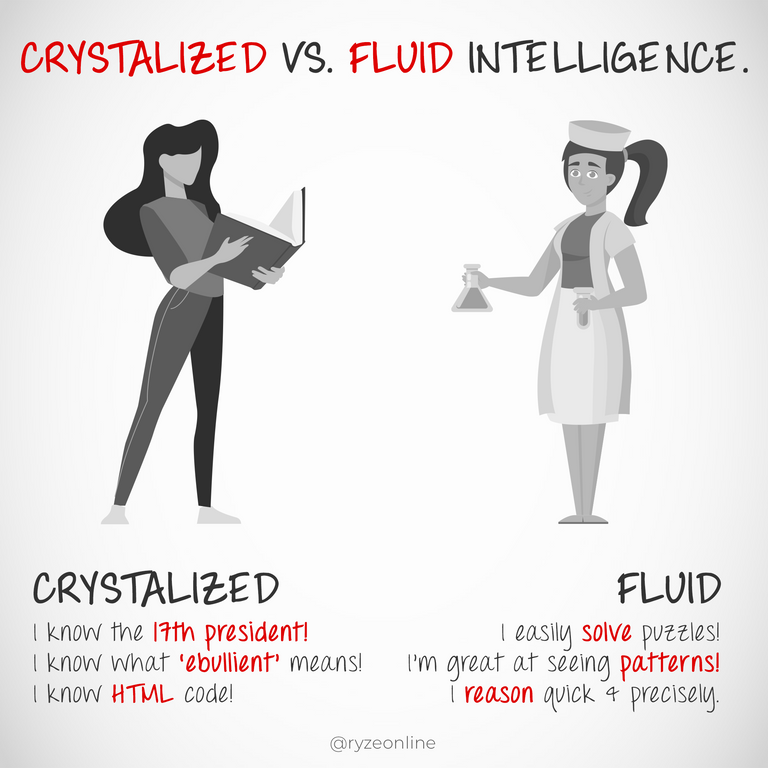
We each have different degrees of both. And they change at different rates as we grow. To me, a ‘smart’ person is one with good amounts of skill in both areas. Similar to how a good car has speed & responsiveness."
"Yo. You've been making more sense than I've ever seen on the topic of smarts, but my head is actually swimming right now. You mind if we switch the scene? Go for a walk or something?"
"Oh, yeah, for sure, my ass is killing me and my legs gots to stretch fo' sho."
While George figured out the Interac machine and paid the bill, I tidied our table and Steph flirted with me, then we exited into the fresh air.
It felt like a divine blessing. When you think about it, it's a marvel that so much oxygen is just floating around ready to energize every single cell we have. I told George as much, he called me drunk, and our chatter devolved into frat jokes that'd likely get us 'cancelled' if anyone heard.
"...I told her my brain needed more oxygen if she wanted me to keep this up. You know her reply? She told me I was a very cunning linguist!" George managed to gasp out his punchline between spasms of laughter.
I chuckled. "You're insane."
"True! Which brings us back to our genius talk."
"You know what's absolutely mental about everything I've covered so far?"
"No clue."
"The funny thing is, it almost feels like a waste of time to explain."
"Why?"
"Because none of this stuff applies to my explanation of intelligence. My explanation is way different."
George's face looked like he just heard a record needle-scratch. "uh-WHAT?"
Continued In Part 2.
Due to Hive's post-size limits, part 1 ends here. Return to this sentence for a link to PART 2, which will be posted in about half an hour. (Edit: How To Be Smarter - George's Guide - Pt. 2)
Thus ends...
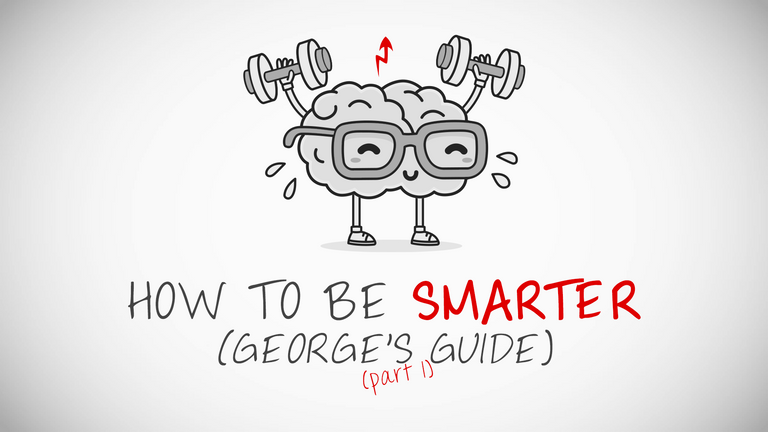
(Edit: Made minor edits, including post-name & thumbnail.)
@lucylin, you and Ryze might have more in common than you realised. 😉
@lucylin, you and Ryze might have more in common than you realised. 😉
😉
lol - he is like the carbon copy of me - 20 years ago....
I would posit that it's not society that's done this, it's simply just human nature to take the path of least resistance. In fact I'd say it's animal nature all around. Society had developed around our nature, we haven't created it to change our nature. That would just be too much like hard work. 😉
This is exactly what I was thinking. We can spend hours over thinking things and seeing all kinds of complex plans, but often it's when we realise it's just a simple explanation that it all slots into place. Yet we like to categorise to keep everything in simple order, which is why we strive to find that elusive measurement for things. I guessed that way we can come up with solutions to things. Algorithms we can put in a computer, perhaps, to make all the 'right' decisions for us. 🤔
Onwards to part 2
A wonderful thing to posit, and I agree...somewhat.
Yes, it's nature to take the path of least resistance but 'avoiding effort' creates weakness and atrophy, ultimately making all paths into one of struggle and resistance.
Animals understand this and so, even the sloth makes sure to maintain enough strength and self-challenge to ensure fitness, well-being, and growth.
Kids naturally know this as well, and make sure to stay active and self-challenge.
If they grew up 'feral', they'd keep up their 'effortfulness', as nature encourages.
It's only after living in society for long enough that kids forget that 'effort' actually IS the path of least resistance, as shown by nature.
(Note: It may be better to replace the word 'effort' with 'application', and debatably I should edit the post to reflect this, but you get the overall point I hope.)
Yes! Ever-seeking the 'one algorithm' that can solve everything often seems to be the mission, but even if one existed, which I doubt, I imagine knowing it would make life pretty boring.
Thanks for an excellent comment, looking forward to your thoughts on part two! 👍
I'm going to disagree again here. Don't tell me you've never seen a fat, lazy pet. 😉
In the wild animals don't get a choice about honing their skills in order to survive, hence why it's natural to take the path of least resistance when the opportunity presents itself. Save effort and energy where you can, because you might need it later. If a lion can chase a weaker animal from its kill to eat it will do that rather than make life harder for itself and try to make its own kill from the herd. It's not thinking, "I should probably let them keep their kill and keep my fitness levels up by catching my own." Especially when most hunts end in failure.
A feral child also keeps their effort into adulthood because...well, key word is "feral". If they are having to survive they do what they have to in order to. No more, no less.
What society allows is for that nature of taking the easiest path to thrive. So we actually have to go against our nature to rise above it and realise that it's not doing us any good to just do what seems easiest; something that takes both intelligence and willpower.
You could even say that we've built society around making things easier for ourselves and have become so successful we've sabotaged ourselves. Now we're stuck in a feedback loop.
You're welcome to. :)
And your pet example proves what I was getting at.
From a cheetah to a sloth, both understand the path of least resistance for them does NOT include atrophy, or failure to apply themselves to life. Both will play. Both will locomote for reasons beyond survival. Both will apply themselves to life, with 'effort.' Because nature's 'path of least resistance', as you said, calls them to do so.
But if you uproot them, place them into society, and turn them into a pet, they will become trained AWAY from their true nature. The same thing happens to children. Born attuned to nature, taking the 'proper' path of least resistance (one which includes 'application'), they eventually become socialized and begin avoiding effort.
It's possible we agree after all because your conclusion here:
And from your original comment:
The path of least resistance includes application of 'effort,' always has. All creatures of nature understand this, including humans when initially born. Failure to apply effort and self-challenge results in atrophy and stagnation, both of which are opposite to nature's continual growth and evolution. Humans can choose to avoid self-challenge, but it goes against nature and is not the path of least resistance, it's just that many people have somehow convinced themselves it is.
Anyway, potentially we're saying the same thing in different words, and if not, then I'm definitely able to agree to disagree... and either way, I thank you for the wonderful discourse and perspectives.
I appreciate you and wishing you a great day! 🙂 👌 🙏
Feels like a chicken and egg scenario! 🤣
LOL, I guess it's only natural for chickens and eggs. 🤣🤣🤣
@ryzeonline
The usage of the word is very subjective, in different cultures it is used differently, what it means to one person can be different for others. A definition either comes from our own experiences or it is copied from others.
There is no golden definition of what a word means.
It is all good till the point people shares what they believe in, but it goes all wrong when they try to make other people believe what they believe in.
@cynshineonline
Thank you for sharing your perspective. Wishing you a great day! 👍
P.S. @stormcharmer I almost forgot to tag you, and I'm not sure if this actually subverts expectations... I think I need some practice, or a coach, lol. 🙏
If you haven't read it. "Shockwave Rider" by John Brunner. One of my favorite books though it is an odd read. This is a rather profound theme within the entire book. Read it if you get a chance. It is not long compared to something like "Atlas Shrugged" though it has some really interesting things in it. This is indeed at it's core though it has some other things that to me were definitely prescient. Since it in itself was inspired by Toffler's "Future Shock" that might be why it hit some good points.
I am not name dropping for any kind of authority. I don't do that. I don't truly hold anyone as an authority. If I share it is purely for interest. I actually am not a fan of name dropping without value. Shockwave Rider is science fiction and it is kind of Cyberpunk though actually much more accurate than the Gibsonian approach of "Neuromancer".
I've not read Shockwave Rider, and I can barely remember anything by Rand despite having read Atlas & BNW, but I loved the whole Neuromancer series, so I'll add it to my reading list. Thank you, I appreciate the recommendation.
I also appreciate the clarification regarding name-dropping, though I already sussed out as much from the demeanor I picked up in your other comments.
Consider William Gibson was a guy that knew nothing about computers who came up with this brilliant concept of Cyberpunk setting which he wrote on a manual type writer I believe.
Pretty amazing.
Shockwave Rider on the other hand is a bit more the direction we've gone but has some things we haven't gotten to. It does have some problems that I think are impacting the world and are negative in this novel (I was written quite some time ago). It also has a lot regarding the search for Wisdom as opposed to simply intelligence. It definitely has a cyberpunkish feel to it. Most people would likely prefer Gibson's book, but the concepts and such in Shockwave Rider are powerful.
I know it was inspired by "Future Shock" which is not Sci-Fi but more of futurists trying to make a prediction of which way the world is headed. I've tried reading it a few times and haven't gotten too far. I suspect it'd be easier if I'd read it before many of those things had already come to pass.
Yes, an impressive feat from Gibson, imho.
Shockwave Rider sounds quite interesting and has been added to my list.
The 'shock' from future-predictions is lessened by reading them after things have occurred, I'd imagine. 😄
Brave New World is not by Rand, but definitely is an eye opener. Considering who the brother of the author of BNW was that makes it even a bit more of an eye opener. It's kind of a "What might this guy know that the rest of us don't?" type of situation.
Aldous Huxley (I had to look it up. Couldn't recall it off the top of my head)
His brother being Julian Huxley a big proponent of eugenics.
I don't know what came from that, but it is said he walked in some powerful circles. People have stated this influenced BNW quite a bit.
Ugh, I've made this mistake more than once, I'm not entirely sure why. Thank you for the correction. 🙏
Just to be clear, regardless of my mis-speaking, I have read both books, Rand's and Huxley's, back when I was in high-school, lol.
I wrote a lot about influence in my censorship & free speech post, and it wouldn't surprise me if Julian influenced BNW significantly. 🙂
For thinking posts... make sure to include #proofofbrain as one of your tags. It is a great community. It also pays you in additional crypto which is worth quite a bit. If you choose to stake it you can award other people proof of brain tokens as well.
HIVE is obviously the main platform. However, peakd.com is different way of looking at it. proofofbrain.io is another website for HIVE focusing on proof of brain. However, those posts also appear on HIVE.
I tend to use PEAKD.COM as my preferred way to interact with the platform. It is very nice though I've used all three.
EDIT: Nevermind about the PEAKD reference. I can clearly see from one of your other posts that yo know all about it. :)
I was under the impression that #proofofbrain was a token / front-end, but if I was mistaken I'll gladly begin tagging my posts with it. Thank you sir.
Heheh, I appreciate any and all well-intentioned, respectful tips about Hive, even if I've already discovered them in some other way. Thank you for looking out for me, and even more for recognizing that I was already aware of it, returning here, and editing your comment.
Great attention to detail and considerate communication, you rock. 😁
proofofbrain.io is a front end kind of like peakd. POB is the proof of brain token. If people have awarded you any when you are looking at your wallet click on HIVE ENGINE wallet and you'll see the other tokens.
You can easily stake them there. Or you can go into the market and trade them for SWAP.HIVE
When you have SWAP.HIVE you can withdraw that to actual HIVE. Then you do whatever you'd choose to do with hive.
The link at the bottom of the token list
Is where you want to go to withdraw the swap.hive
I've begun to stake more of my PoB as it apparently awards quite well with votes. My friend @thatgermandude here informed me I think that at around 2000 PoB staked he can vote about $2 worth.
1030 POB staked makes my 100% vote worth a total of 1.9 POB
never thought I would actually enjoy high inflation :)
Very helpful and informative. I learned a lot about Proof Of Brain (and second layer tokens in general) from your comments here, thanks to you (and more indirectly, @thatgermandude as well)! 🙏
You do indeed have some POB:
As you can see they are actually worth quite a bit too. A few weeks ago they were worth more than that.
I appreciate you going the extra mile with this extra comment and screenshot. Very kind of you, I didn't even know I had POB. :)
Yet another great post, matey !
I'm far too lazy (or is that 'efficient with my time?') to respond fully here - but I will do a post about it in the next day or two...So much to unpick....I'm busy dealing with ignorant people at the moment.....of which you explained beautifully in your post, btw - it's a shame many of your supporters are too ignorant to actually understand what you so eloquently lay out.. (using 'action' as the metric)
The irony of the idiots, is palpable (and yes, I use the term intentionally, for my own reasons - of which will become clear in my upcoming posts).
All good stuff, matey!
Thank you kindly, I appreciate it.
By all means, respond however suits you, I wouldn't expect otherwise. And wishing you lots of success dealing with whatever it is you're dealing with.
I'm glad you're intentional with your reasons.
Good stuff indeed, thanks again! 🙏